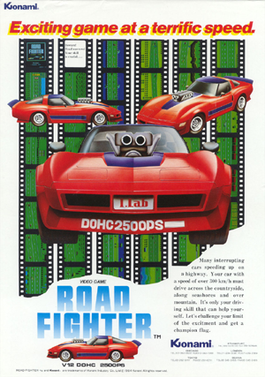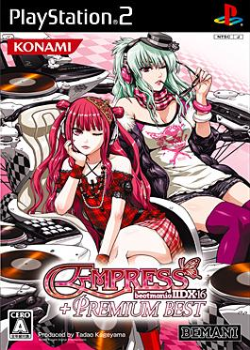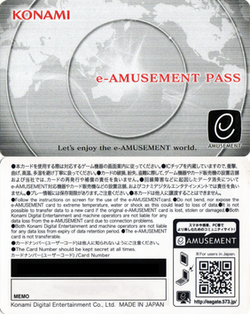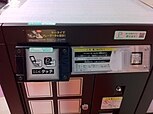Dance Dance Revolution (DDR) is a music video game series produced by Konami. Introduced in Japan in 1998 as part of the Bemani series, and released in North America and Europe in 1999, Dance Dance Revolution is the pioneering series of the rhythm and dance genre in video games. Players stand on a "dance platform" or stage and hit colored arrows laid out in a cross with their feet to musical and visual cues. Players are judged by how well they time their dance to the patterns presented to them and are allowed to choose more music to play to if they receive a passing score.

A smart card (SC), chip card, or integrated circuit card, is a card used to control access to a resource. It is typically a plastic credit card-sized card with an embedded integrated circuit (IC) chip. Many smart cards include a pattern of metal contacts to electrically connect to the internal chip. Others are contactless, and some are both. Smart cards can provide personal identification, authentication, data storage, and application processing. Applications include identification, financial, public transit, computer security, schools, and healthcare. Smart cards may provide strong security authentication for single sign-on (SSO) within organizations. Numerous nations have deployed smart cards throughout their populations.
Beatmania (ビートマニア) is a rhythm video game developed and distributed by Japanese game developer Konami and first released in December 1997. It contributed largely to the boom of music games in 1998, and the series expanded not only with arcade sequels, but also moved to home consoles and other portable devices, achieving a million unit sales. The Bemani line of music games from Konami is named after the series, was first adopted in the arcade release of Beatmania 3rdMix and kept ever since. The series came to an end with the last game being Beatmania The Final, released in 2002.

Konami Group Corporation, commonly known as Konami, is a Japanese multinational entertainment company and video game developer and publisher headquartered in Chūō, Tokyo. The company also produces and distributes trading cards, anime, tokusatsu, pachinko machines, slot machines, and arcade cabinets. It has casinos around the world and operates health and physical fitness clubs across Japan.

Beatmania IIDX (IIDX) is a series of rhythm video games, that was first released by Konami in Japan on 26 February 1999. Beatmania IIDX has since spawned 31 arcade releases and 14 console releases on the Sony PlayStation 2. It is the sequel to the beatmania game series, and is part of the Bemani line of music games.
Bemani, stylized as BEMANI, is Konami's music video game division. Originally named the Games & Music Division (G.M.D.), it changed its name in honor of its first and most successful game, Beatmania, and expanded into other music-based games, most notably rhythm games such as Dance Dance Revolution, GuitarFreaks, and DrumMania.
beatmania III is a rhythm video game created by Konami. Gameplay is essentially the same as in the beatmania series, with a few enhancements to the hardware.

Road Fighter is a racing arcade video game developed by Konami and released in 1984, and was the first racing game from the company. The goal is to reach the finish line within the stages without running out of time, hitting other cars or running out of fuel. The game spawned a spiritual successor, Konami GT (1986), and two sequels, Midnight Run: Road Fighter 2 (1995) and Winding Heat (1996). A Japan-only sequel was also released 14 years later, Road Fighters (2010).

beatmania IIDX 10th Style is the tenth game in the beatmania IIDX series of music video games. It was released in arcades by Konami in early 2004.

Beatmania IIDX 9th Style is the ninth game in the beatmania IIDX series of music video games. It was released in arcades by Konami in 2003. The game features over 50 new songs, some of which can be unlocked using Konami's e-Amusement platform – which made its official debut on 9th Style.

beatmania IIDX 7th Style is the seventh game in the beatmania IIDX series of music video games. It was released in arcades by Konami in March 2002.

Beatmania IIDX is an arcade music video game developed by Bemani and published by Konami. It was released in Japan on February 26, 1999. The objective is to perform songs using a controller with seven keys and a turntable. After the surprise success of Beatmania, Benami conceived IIDX to simulate an actual disc jockey (DJ) live performance. Its arcade cabinet contains a widescreen monitor, speakers, and eight spotlights. Bemani later developed several updated versions of IIDX to increased success. The game retrospectively received a positive reception from video game publications for its gameplay and increased difficulty. A sequel, Beatmania III, was released in 2000.

Beatmania IIDX 16: Empress is the 16th game in the Beatmania IIDX series of music video games. It was released in arcades by Konami on November 19, 2008. The game features over 50 new songs, some of which are unlocked over Konami's e-Amusement platform. The design of Empress's interface is based on a pink color scheme, dominated by sparkles, butterfly wings, and motifs of royalty and jewellery. A PlayStation 2 port for the game was released on October 15, 2009, in Japan.

Beatmania IIDX 17: Sirius is the 17th installment in Konami's Beatmania IIDX series of music video games. The main motif of Sirius's UI is astronomy, as the game is named after Sirius, known to be the brightest star in the night sky. Public location tests began on May 27, 2009, and the game itself was released on October 21, 2009.

Beatmania IIDX 18 Resort Anthem is a music video game in the Beatmania IIDX series of games by Konami. On April 19, 2010, Bemani fansite Zenius -I- Vanisher reported that Konami had announced the first location test for the newest game in the IIDX series. The location test ran from April 22 to April 26 at the Cat's Eye Machida (キャッツアイ町田) in Machida, Tokyo. Follow-up location tests ran in Chōfu, Tokyo and Kyoto from April 30 to May 6, in Nagoya and Sapporo from May 14 to May 20 and in Chiyoda, Tokyo from June 11 to June 12. The game was released on September 15, 2010 This Beatmania iteration's theme focuses heavily on a futuresque modern relaxation and tropical beach resort concert-like setting, with the interface making use of sleek mechanical components with simple whites and bright colors that are easy on the eyes.

Beatmania IIDX 21: Spada is a music video game and the 21st installment of Beatmania IIDX series of video games. The main motif of the game revolves around swords, as the title of the game, Spada is Italian for sword. The UI has a medieval fantasy theme and mainly features black, brown, and red colors. It was first announced on June 12, 2013. Location tests began in Akihabara on June 14, 2013 and ended on June 16, 2013. It was released on November 13, 2013.
The Taito NESYS is an arcade game network communication system by Taito. It connects up arcade machines via a network, and allows players to participate in national rankings and online play, as well as allowing arcade operators to download updates for games. The Taito NESiCAxLive digital distribution system uses NESYS as its networking system.
ALL.Net is an arcade video game network communication system and digital distribution system made by Sega Corporation. It is similar to the Taito NESiCAxLive game distribution systems and NESYS arcade network; the player smart card system is similar to the Konami e-AMUSEMENT system. It enables arcade games to be connected via the Internet, enabling communication battles, national rankings, and storage of play data.













